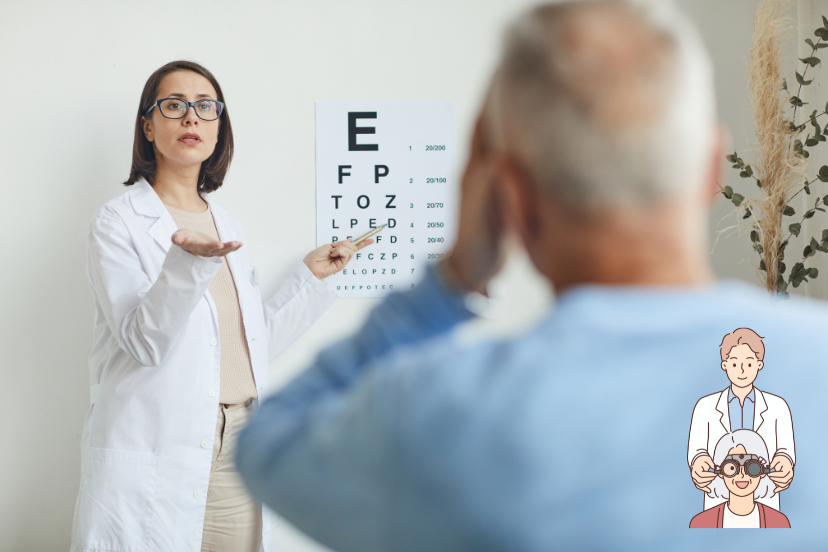What Does 20/50 Vision Mean
As someone passionate about vision health and eager to provide helpful suggestions, I understand the importance of clear and accurate vision. In this “What does 20/50 vision mean” article, I will explain what 20/50 vision means, the causes behind it, the symptoms associated with it, and provide helpful suggestions on managing this condition.
Introduction
Having a clear vision is essential for our daily activities, such as reading, driving, and enjoying the world around us. However, some individuals may experience vision impairments, including 20/50 vision. In simple terms, 20/50 vision means that a person with this condition sees objects at 20 feet away as clearly as someone with normal vision would see them from 50 feet away.
20/50 Vision Meaning
Visual acuity of 20/50 means that a person can see at 20 feet, and a person with normal vision can see clearly at 50 feet. In other words, someone with 20/50 vision needs to be 20 feet away from an object to see it as clearly as someone with normal vision would see it from 50 feet away. This level of visual acuity indicates that the person has difficulty seeing objects clearly at a distance and may require corrective lenses or visual aids to improve their vision.
Definition Of 20/50 Vision
When an eye doctor measures your visual acuity, they use a standardized test called a Snellen chart. This chart consists of letters and numbers of various sizes. If you have 20/50 vision, it means that you can see an object clearly at 20 feet away, while a person with normal vision can see the same object clearly from 50 feet away.
Is 20/50 Vision Bad?
Regarding visual acuity, 20/50 vision is considered below average or somewhat impaired. While not classified as severe, it indicates difficulty seeing objects clearly at a distance. People with 20/50 vision may struggle with tasks such as reading road signs or recognizing faces from a distance. However, it is essential to note that visual acuity is just one aspect of overall vision health, and individuals with 20/50 vision may still have good peripheral vision and other visual capabilities. Eyeglasses, contact lenses, or corrective surgeries can improve vision for those with 20/50 vision.
Causes Of 20/50 Vision
Several factors can contribute to 20/50 vision. Some common causes include:
- Refractive Errors: Conditions such as nearsightedness (myopia), farsightedness (hyperopia), or astigmatism can affect your ability to see clearly.
- Age-related Changes: As we age, our eyes undergo natural changes that can result in a decline in visual acuity.
- Eye Conditions: Certain eye conditions, such as cataracts or macular degeneration, can lead to reduced vision.
- Eye Injuries: Trauma or injuries to the eye can cause vision problems, including 20/50 vision.
It’s essential to consult with an eye care professional to determine the underlying cause of your 20/50 vision and receive appropriate treatment.
Symptoms Of 20/50 Vision
People with 20/50 vision may experience the following symptoms:
- Blurry or unclear vision, especially when looking at distant objects.
- Difficulty reading small print or signs from a distance.
- Eye strain or fatigue.
- Squinting or tilting the head to see more clearly.
- Increased sensitivity to glare or bright lights.
If you notice any of these symptoms, it is advisable to schedule an eye examination to assess your vision and identify any underlying issues.
Diagnosing 20/50 Vision
To diagnose 20/50 vision, an eye doctor will perform a comprehensive eye examination, which may include:
- Visual Acuity Test: Using a Snellen chart, the doctor will measure how well you can see at various distances.
- Refraction Test: This test helps determine the exact prescription for corrective lenses if needed.
- Ocular Health Evaluation: The doctor will examine the overall health of your eyes, checking for any underlying conditions or abnormalities.
Based on the findings from these tests, the eye care professional will provide a diagnosis and recommend suitable treatment options.
Treatment Options For 20/50 Vision
Fortunately, several treatment options are available to improve or correct 20/50 vision. These include:
Prescription Eyeglasses
Wearing corrective lenses, such as glasses with the appropriate prescription, can significantly enhance vision clarity.
Prescription eyeglasses can improve or correct your vision by compensating for the refractive error in the eyes. The lenses are specifically designed based on the individual’s visual needs, such as nearsightedness or farsightedness. By wearing the prescribed glasses, the light entering the eyes is properly refracted, allowing for clearer vision and enhancing visual acuity. The glasses effectively adjust the focal point, enabling the person with 20/50 vision to see objects more clearly at a distance.
Contact Lenses
For those who prefer an alternative to glasses, contact lenses can provide clear vision while offering convenience and flexibility.
Contact lenses can improve or correct 20/50 vision by directly adhering to the surface of the eye. They work by altering the path of light as it enters the eye, compensating for refractive errors. The lenses are customized to the individual’s prescription, correcting nearsightedness or farsightedness. By placing the contact lenses on the eye, they effectively refract light, allowing for clearer vision and enhancing visual acuity, similar to how prescription eyeglasses work.
Refractive Surgery
Procedures like LASIK or PRK can reshape the cornea to correct refractive errors and improve visual acuity.
Refractive surgery, such as LASIK or PRK, can improve or correct your vision by reshaping the cornea to alter it’s focusing power. During the surgery, a laser is used to remove tissue from the cornea, correcting nearsightedness, farsightedness, or astigmatism. By reshaping the cornea, the surgery aims to improve the eye’s ability to focus light properly on the retina, resulting in clearer vision and improved visual acuity without the need for glasses or contact lenses.
It’s crucial to consult with an experienced eye surgeon or optometrist to determine the most suitable treatment option for your specific needs.
Lifestyle Changes
In addition to medical interventions, specific lifestyle changes can help improve overall vision health and manage 20/50 vision:
Healthy Diet
Consuming a balanced diet rich in vitamins and minerals, particularly those beneficial for eye health, can support optimal vision.
A healthy diet can support overall eye health and potentially improve or correct vision. Nutrients like vitamins A, C, E, and omega-3 fatty acids found in foods like carrots, spinach, citrus fruits, and fish can aid in maintaining good eye function. However, it is best to consult an optometrist or ophthalmologist for appropriate interventions, such as glasses or contact lenses, for significant vision correction.
Regular Exercise
Engaging in regular physical activity improves blood circulation and contributes to good eye health.
Regular exercise can indirectly improve or maintain healthy vision by promoting overall cardiovascular health. Engaging in activities like walking, jogging, or aerobic exercises helps enhance blood circulation, including to the eyes. Adequate blood flow to the eyes supports optimal functioning and may aid in preserving visual acuity. However, for vision correction, seeking professional advice from an eye care specialist is advisable.
Eye Protection
It’s important to wear appropriate eye protection when engaging in activities that could potentially harm the eyes, such as sports or working with hazardous materials.
Wearing sunglasses with UV protection and safety goggles can help maintain and protect vision. Shielding the eyes from harmful ultraviolet (UV) rays and potential injuries reduces the risk of eye damage, which can contribute to maintaining visual acuity. However, for vision correction, it is essential to consult with an optometrist or ophthalmologist for appropriate interventions and treatments.
Tips For Maintaining Good Vision
To maintain good vision and reduce the risk of developing 20/50 vision or other vision problems, consider the following tips:
- Practice Proper Eye Hygiene: Wash your hands before touching your eyes, avoid rubbing your eyes excessively, and regularly clean contact lenses.
- Take Breaks from Screens: Extended periods of screen time can strain the eyes. Remember to take regular breaks.
- Practice the 20-20-20 rule: Every 20 minutes, look at something 20 feet away for 20 seconds.
- Protect Your Eyes from the Sun: Wear sunglasses that offer 100% UV protection to shield your eyes from harmful sun rays.
20/50 Vision – Conclusion
Having 20/50 vision means that at a distance of 20 feet, you can see objects clearly that individuals with normal vision can see at 50 feet. While it indicates some degree of visual impairment, there are several ways to manage and improve this condition. Seeking professional guidance from an optometrist or ophthalmologist is crucial to determine the underlying cause and appropriate interventions. Corrective measures such as prescription glasses, contact lenses, or refractive surgery can significantly enhance visual acuity. Additionally, adopting a healthy lifestyle that includes a balanced diet, regular exercise, and protecting the eyes from harmful elements can contribute to maintaining and improving overall eye health. Regular eye examinations are vital for monitoring changes and ensuring optimal vision care.
Please note that this article should not replace professional medical advice. Consult a healthcare professional for an accurate diagnosis and tailored treatment plan.
Frequently Asked Questions (FAQs)
Can 20/50 vision be corrected?
It can be corrected through various treatment options, such as prescription eyeglasses, contact lenses, or refractive surgery.
Is 20/50 vision considered legally blind?
No, It is not classified as legally blind. Legal blindness is defined as having a visual acuity of 20/200 or worse in the better eye or having a restricted field of vision.
Can lifestyle changes improve 20/50 vision?
While lifestyle changes alone may not fully correct your vision, they can contribute to overall eye health and potentially slow down the progression of certain eye conditions.
How often should I get my eyes examined?
It is recommended to have a comprehensive eye examination every one to two years or as advised by your eye care professional.
Are there any natural remedies for improving 20/50 vision?
While certain lifestyle changes and habits can support good eye health, there are no proven natural remedies to cure or improve vision. It’s important to seek professional advice for appropriate treatment options.




